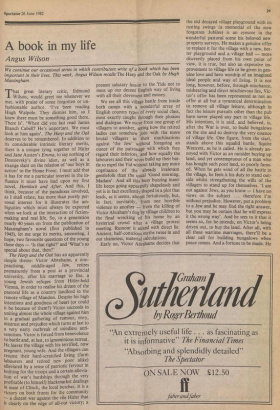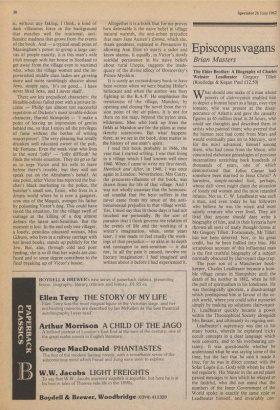A book in my life
Angus Wilson We continue our occasional series in which contributors write of a book which has been important in their lives. This week, Angus Wilson recalls The Harp and the Oak by Hugh Massingham.
That great literary critic, Edmund Wilson, would greet me whenever we met, with praise of some forgotten or un- fashionable author. 'I've been reading Hugh Walpole. They dismiss him, so I knew there must be something good there. There is'. 'When did you last read James Branch Cabell? He's important. We must look at him again'. The Harp and the Oak deserves to be remembered. In addition to its considerable intrinsic literary merits, there is a unique tying together of Hitler and Jane Austen's Emma, to say nothing of Dostoevsky's divine idiot, as well as a strange slant on the relation of 'our boys in action' to the Home Front. I must add that it has for me a particular interest in the in- fluence it must have had upon my first novel, Hemlock and After. And this, I think, because of the paradoxes involved, as I shall relate, has more than purely per- sonal interest for it illustrates the am- biguities which must always be expected when we look at the interaction of fiction- making and real life. So, to a generation nearly 40 years on from the publication of Massingham's novel (first published in 1945), let me urge its merits, answering, I hope, two favourite questions of the young these days — 'Is that right?' and 'What's so special about that, then?'
The Harp and the Oak has an apparently simple theme: Victor Abrahams, a non- practising, middle-aged Jew, retires prematurely from a post at a provincial university, after his marriage to Ilse, a young Jewish refugee from Hitler-held Vienna, in order to realise his dream of the Pastoral life as a country landlord in the remote village of Mandon. Despite his high intentions and goodness of heart (or could it be because of them?) Victor succeeds in ,uniting almost the whole village against him in a gradual gathering of rumour, envy, mistrust and prejudice which turns at last to a very nasty outbreak of mindless anti- semitism. Victor is forced from benevolence to battle and, at last, to ignominious retreat. He leaves the village with his terrified, now Pregnant, young wife. And the villagers can resume their hard-scratched living (farm labourers and retired new poor alike) alleviated by a sense of patriotic fervour in knitting for the troops and a certain allevia- tion of war's hardships through the very Profitable (to himself) blackmarket dealings In meat of Clinch, the local butcher. It is a Victory on both fronts for the community —a distant war against the vile Hitler that IS clearly on the edge of all-out victory; a
present salutary lesson to the Yids not to mess up our decent English way of living with all their cleverness and money.
We see all this village battle from inside both camps with a wonderful array of English country types of every social class, most exactly caught through their phrases and dialogue. We move from one group of villagers to another, seeing how the retired ladies can somehow join with the more brutal villagers in their machinations against 'the Jew' without foregoing an ounce of the patronage with which they regard their inferiors, and how equally the labourers and their wives build up their bat- tle to expel the Yid without taking any more cognisance of the already irrelevant gentlefolk than the usual 'Good morning, Madam'. And all this busy buzzing insect life keeps going apparently shapelessly and yet is in fact excellently shaped in a plot that leads, as it seems, almost fortuitously, but, in fact, inevitably, from one horrible violence to another — from the killing of Victor Abraham's dog by village children to the final wrecking of his home by an hysterical crowd after a village protest meeting. Rumour is mixed with direct lie. Ancient, half-conscious myths twine in and out shameless, material calculations.
Early on, Victor Abrahams decides that the old decayed village playground with its rusting swings (a memorial of the now forgotten Jubilee) is an eyesore in the wonderful pastoral scene his beloved new property surveys. He makes a genuine offer to replace it for the village with a new, bet- ter playground and a village hall — more discreetly placed from his own point of view, it is true, but also an expensive im- provement to village life to be given in gen- uine love and hero worship of an imagined ideal people and way of living. It is not long, however, before, through mischance, mishearing and direct mischievous lies, Vic- tor's offer has been represented as not an offer at all but a tyrannical determination to remove all village leisure, although in fact the leisure pursuits other than the pub have never played any part in village life. His intention, it is said, and believed, is, after the War is over, to build bungalows on the site and so destroy the very essence of village life. One figure, from the start, stands above this squalid battle, Squire Westcott, as he is called. He is already an- noyed with Victor as an outsider buying up land, and yet contemptuous of a man who has bought such poor land, so poorly farm- ed. When he gets wind of all the battle in the village, he feels it his duty to stand out- side whilst strengthening the wills of the villagers to stand up for themselves. 'I am not against Jews, as you know — I have no views on the subject ... therefore I'm without prejudice. However, put a problem to a Jew and he may find the right answer, but you may be certain that he will express it the wrong way'. And he sees to it that it seems so, for he intends, on Victor's being driven out, to buy the land. After all, with all these wartime marriages, there'll be a clear call for building bungalows when peace comes. And a fortune to be made. He is, without any faking, I think, a kind of dark villainous force in the background that matches well the irrational, anti- Semitic madness that grows from the events of the book. And — a typical small point of Massingham's power to group a large can- vas of people exactly, it is this man's wife (rich enough with her house in Scotland to get away from the village even in wartime) who, when the village women and the im- poverished middle class ladies are growing more and more ramblingly abusive about Jews, simply says, 'It's no good... I have never liked Jews, and I never shall'.
There are less prejudiced characters: the likeable-odious failed poet with a private in- come — Philip (an almost too successful repetition of Dickens's most lovable-odious character, Harold Skimp°le) — 'I make a point of leaving an impression of genius behind me, so that I enjoy all the privileges of . fame without the bother of writing masterpieces'. The very pleasing but totally drunken well educated owner of the pub, Mr Fortune. Even the weak vicar who lives in the word 'jolly' — 'jolly difficult' he finds the whole situation. They do go so far as to urge Victor and his wife to leave before there's trouble, but they will not speak out on the Abrahams's behalf. At one point, after Victor has reported the but- cher's black marketing to the police, the butcher's small son, Ernie, who lives in a dream world where he is now a gangster, now one of the Maquis, avenges his father by poisoning Victor's dog. This could have saved the situation, for the village swell of outrage at the killing of a dog almost defeats the latent anti-Semitism. But the moment is lost. In the end only one villager, a lonely, penniless educated woman,. Miss Gibson, who lives in a railway carriage with her loved books, stands up publicly for the Jew. But, alas, through cold and poor feeding, she is so ill that her words are con- fused and to some degree contribute to the final breaking up of Victor's house. Altogether it is a book that for me proves how detestable is the naive belief in village natural warmth, the anti-urban prejudice that mars Jane Austen's Emma, which she, thank goodness, expiated in Persuasion by allowing Ann Eliot to marry a sailor and know alarms. It equally, in Victor's slowly suicidal persistence in his naive beliefs about rural Utopia, suggests the inade- quacy of the divine idiocy of Dostoevsky's Prince Myshkin.
It is surely an extraordinary book to have been written when we were beating Hitler's holocaust and when the author was busy fighting in the R.A.F. He emphasises the remoteness of the village, Mandon, by opening and closing the novel from the vi- sion point of the air pilots. It is not for them on the map, beyond the pylon area, wilderness. Men who look up from the fields at Mandon are for the pilots at most sketchy scarecrows. But what happens there, as we see in the book, does matter in the history of one man's spirit.
I read this book probably in 1946, the year that I started writing. I was then living in a village which I had known well since 1940. When I came to write my first novel, Hemlock and After, in 1948, I was once again in London. Nevertheless, Mrs Curry, the procuress-villainess of the book, was drawn from the life of that village. And I was not wholly unaware that the homosex- ual scandal that the hero suffers in the novel came from my sense of the anti- homosexual prejudice in that village world. Yet, I must say that in those days it had not touched me personally. By the sort of paradox that I think governs the relation of the events of life and the working of a writer's imagination, when, some years later, I was made to feel cruelly the work- ings of that prejudice — so akin in its depth and contagion to anti-semitism — it did not, in all the pain it caused, involve my literary imagination. I had imagined and written about it before I had experienced it.























































 Previous page
Previous page